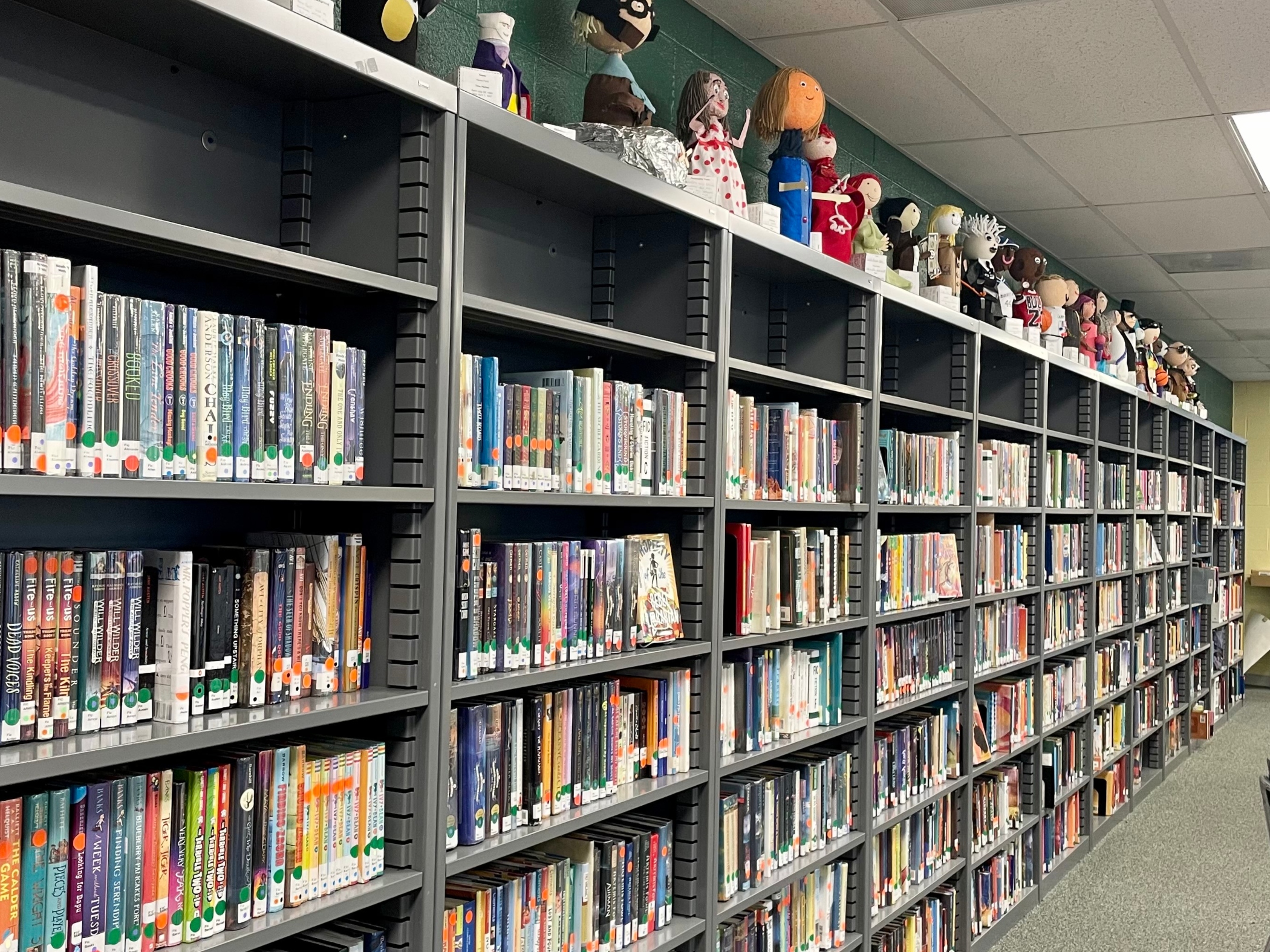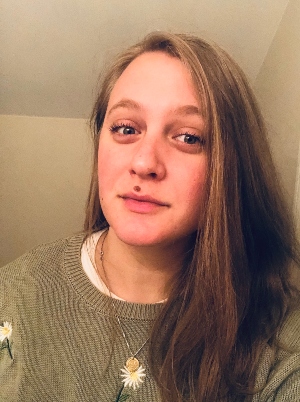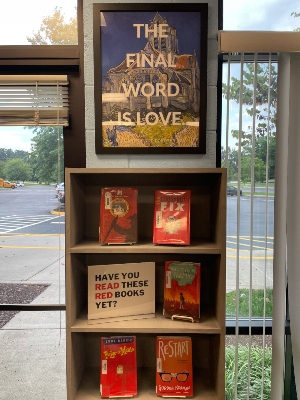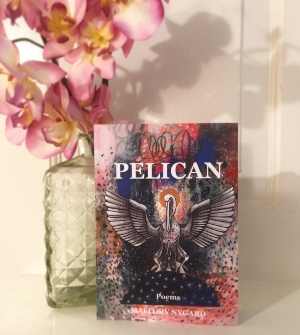A conversation with Mallory Nygard, English alumna

Mallory Nygard graduated from Catholic U in 2016 with a major in English and minors in Philosophy and Theology and Religious Studies. While at CUA she was active in English Society and served as Editor-in-Chief on the founding board of Inventio, the university’s first undergraduate research journal. She earned her Master’s in Library Science from Indiana University in 2019.
What is your current job/title?

Why did you choose to study English at Catholic U.?
I had an English teacher in high school who really opened up literature for me, who showed me how to read a book in a deeper way than just trying to understand what was going on in the story. I wanted to learn how to become an even better reader; I wanted to read everything and to read it well. Catholic U offered an English program that was attractive to me for both its breadth and depth. I chose English because I understood that I was looking for formation in my education, not just a career path, and that to study literature is to study what it is to be human.
What was your path from graduation to your current job like? What advice can you give senior majors and recent grads about life after graduation and the job market?
The great and terrible thing about an English degree is that there is not just one thing we do after graduation. A key part of my job search as I finished undergrad was talking with my advisor about possible options I could pursue. Through several discussions with him, I came to understand that I wanted to help bring great literature to other people, that it was important to me to share what I had learned as an English major.
After graduating, I had a year-long writing and editing fellowship with a Catholic education nonprofit, but I felt like I was too far removed from where the action was actually happening. Writing policy was a long way from actually connecting with people through literature.
When my fellowship was winding down, I spent time scouring job boards, trying to figure out what I wanted to do next. The job postings I found myself returning to were in libraries, where I saw an answer to my desire to connect with people through stories. So, at the end of my fellowship, I went to grad school at a large, public university for my Master’s in Library Science. After my experience there, I wanted to return to the Catholic educational world and accepted a job as the librarian at a Catholic elementary/middle school.
As an undergrad, I wouldn’t have predicted I’d be working in a library now. But I kept asking the questions “What interests me now? and “What do I want to try next?” Deciding what I want to do for the rest of my life was too big of a problem to solve as a recent college graduate. It’s too big of a problem for me even now, five years after graduating. Instead, I focus on exploring my interests and finding where they coincide with what is available. I talk through the options with people I trust and who care about me - mentors, friends, family - and say yes to the next right thing. This allows me the freedom to trust that my life will unfold in ways I can’t predict.
What advice do you have for people who are thinking about pursuing graduate studies in Library Science?

Although the Master’s degree is required to be hired into a leadership role in most libraries, the real key is having work experience.
Working in a library is different than people imagine. While the image of spending quiet time reading your own book while waiting around for someone to gently ask for your personal recommendation is romantic, that isn’t it (most of the time). Learning about the planning, organization, maintenance, budgeting, and programming of libraries is essential.
Some great advice I received while applying to grad school was to choose where to attend my Master’s program based on where I wanted to work while completing the degree. At Indiana University I was able to work in the writing center, with the Teaching and Learning department, at the Law School library, and at a local high school. I also had the opportunity to run a library in a dorm which gave me an incredibly useful inside view of the work it takes to be in charge of a library.
The most important thing to know about being a librarian is that it is an outward-facing public service job; loving people in general and persons in particular is essential!
What do you like the most about your job?
The best days at my job are the ones where I connect with students one-on-one. Talking with students about books they’ve read, books they’re excited to read next, and even books they hated too much to finish is so much fun. When they come in raving about the series they’re reading or begging me to buy another book by an author they love, I am so happy about the path I’m on.
I am the most grateful when I see a student progress from a reluctant reader to someone who has trouble putting a book down. Because I see students throughout their most formative years, an important part of my job is that everyone comes to see him/herself as a “reader” to at least some degree. By learning more about each student, I can better encourage them and make personalized recommendations. Sometimes all it takes is one great book for a student’s sense of readership to be sparked.
For me, though, it’s not only about encouraging students to read. Books serve as a means for connection; they are starting points from which I form relationships with students and try to love them as Christ does.
What did you learn as an English major at Catholic U. that has continued to serve you well?
It’s always worth it to look more closely at a story. That even looking deeply at a story in the first place is an act of love, generosity, and empathy. That we are looking implies there is something to be found.
As I work with young students, I often ask them to tell me about the last book they really liked. Then together we look deeply at that book, analyzing it in order to find what about it connected with that student. Understanding how the parts of a story work together is an essential tool in my repertoire when I am helping students find their next book.
You published a book of poetry recently - did you write creatively in college? What advice do you have for students or recent grads who are creative writers?

One of the excuses I used to avoid writing was that I would never be as good as the masters I was reading in my English classes. I would read Milton and Hopkins and Herbert and Keats and be simultaneously inspired and dejected. They set the bar so high! I thought I had to be great in order to be a poet. As an amateur poet, I wasn’t great, and if I couldn’t be great like the people I was reading, what was the point?
The point, of course, is that writing for me is about communion with another in particular (this reader), not outward acclaim from others in general. The poets I most look up to (Franz Wright, Gerard Manely Hopkins, Mary Oliver, etc.) were often just writing what they needed to write, what was true, and they grew in skill as they wrote more. The only way to become great at writing is to write. So write. Even if you’re not great. And then share it with people so they can love you in your struggle and you can make the connections that show you you are not alone in the writing.
Do you have any advice for current English majors?
The best advice I received while an undergrad was to “defragment my soul,” to try to make the things I studied overlap as much as possible in order to find some coherence. It’s easy to feel like all your classes are completely separate from each other, but finding connections will make each individual class feel more rich and necessary. If you’re taking a Shakespeare class, take a philosophy class that focuses on thought of the same time period. If you’re taking a Chaucer class, take a medieval history class. Study the same thing from multiple perspectives at the same time and you’ll be surprised by the ways the individual classes will enrich the others you’re taking.
The other thing I’d recommend is asking all of the questions you have, even if they feel embarrassing at the time. Learning takes humility to admit what we don’t yet know and vulnerability to ask for the help to know better.
Photo credits: Mallory Nygard
